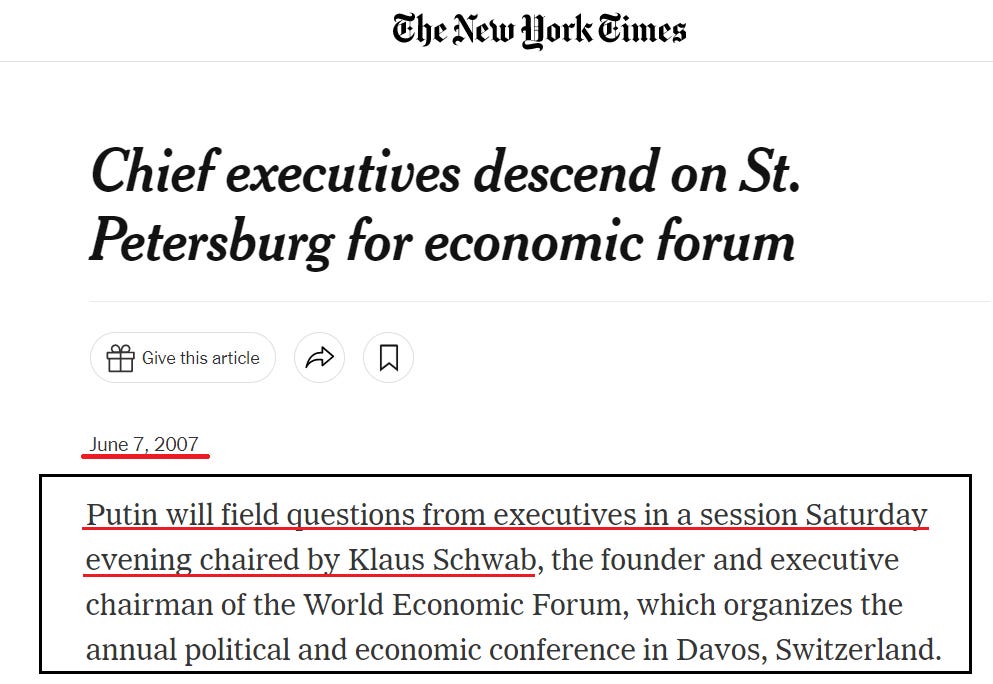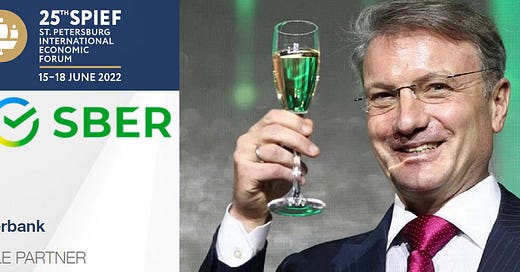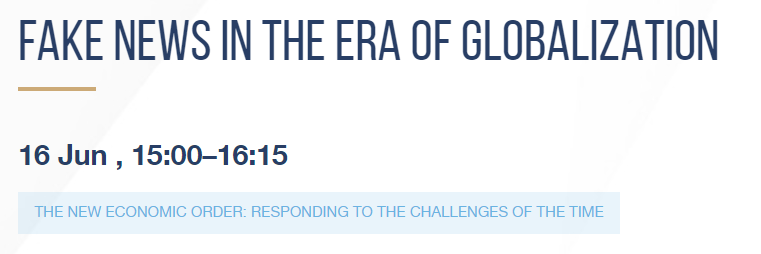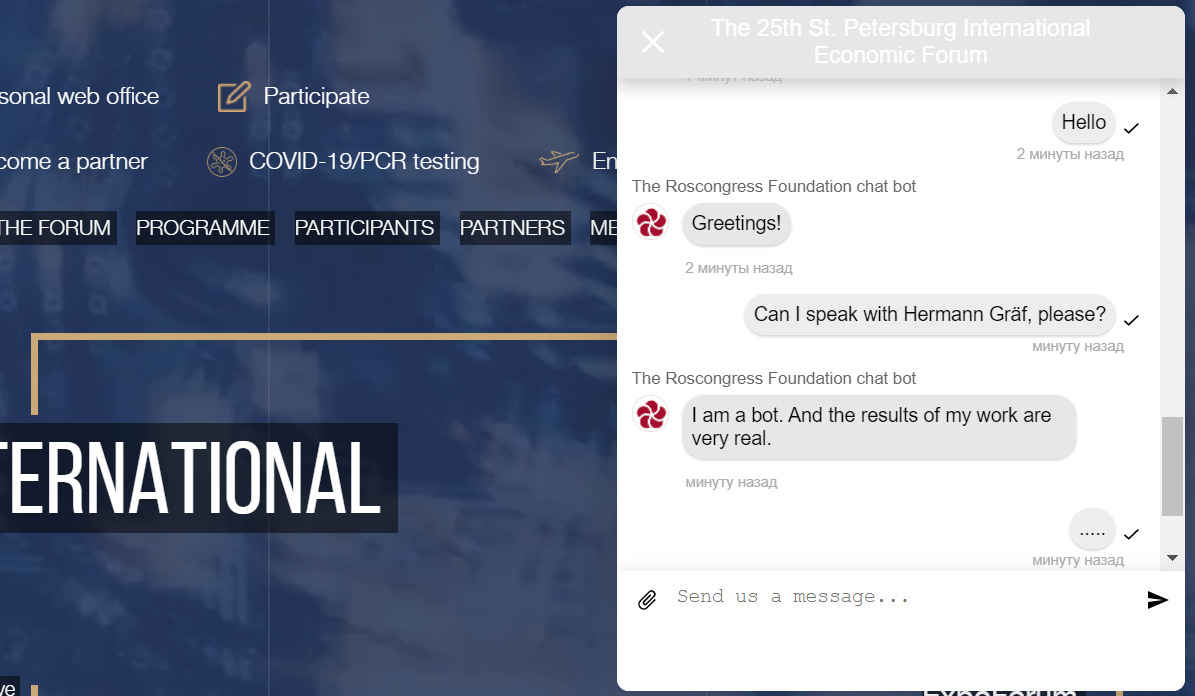Mass vaccination & climate change: A curious agenda at Russia's Davos
The 25th St. Petersburg International Economic Forum is going to be a game changer
Klaus Schwab’s Oligarchic Burning Man finished last week and everyone had a great time predicting how many people would starve to death in the next twelve months. Everyone except for the Russian oligarchs and Kremlin apparatchiks who were rudely excluded from this year’s festivities due to sanctions.
No worries. Russia has its own Davos—the St. Petersburg International Economic Forum—and this year’s agenda is going to vaporize the Federal Reserve.
First thing’s first: if you want to come to this fancy conference you have to test negative:
You’re Virus-free? Good. Here’s a sampling of the “business programme” set to begin on June 16:
Fake news about the dreaded Virus, oh no what should we do:
The problem of fakes is particularly pronounced in times of troubles, such as those under COVID-19 and a tense geopolitical situation – people make rash decisions based on unreliable information, and the consequences can be serious and even fatal. Society was unprepared for the resulting flood of fakes and unable to critically evaluate misinformation on such a grand scale, the direct result of a polluted information environment. The digital literacy of all must be improved, from that of schoolchildren to senior citizens, if we are to create a safe digital environment. This includes connecting the industry to self-regulation, as in the Memorandum on Countering Misleading Information. Who creates and disseminates fakes? How do they influence government policy? How can fakes lead to deaths? And what do the statistics on fakes look like in the special operation in Ukraine?
Okay.
Russia’s business leaders are worried about the climate changing:
A joint climate agenda should be one of the unifying projects in such a diverse region as Eurasia. Today, economic cooperation needs to be developed as part of the climate agenda, partly in an effort to achieve the goals of the Paris Agreement and the UN Sustainable Development Goals, including the necessary approaches and mechanisms based on the principles of the EAEU functioning as a single market.
Realizing the unique potential of Greater Eurasia to achieve climate goals will require rapid solutions to a number of practical issues: reaching a political consensus on key areas of cooperation; preventing negative socioeconomic effects, such as the widening gap between developed and developing nations and the emergence of barriers to trade and investment; finding a balance in public-private partnerships in green financing to stimulate technological transformation, including through extrabudgetary funds; creating a foundation for the free movement of carbon units within the EAEU and further integration with major trading partners; and facilitating the availability of technologies that help reduce emissions and ensure low-carbon development as well as the efficient and sustainable use of fossil-based resources.
Given the current geopolitical situation, is the climate agenda a focus in economic collaboration? How do such issues as accelerated import substitution correlate with the objectives of low-carbon development? How can funding be secured for the transition in technologies? Are the funding sources clear, and how can we bridge the gap with the actual scale of the investment that is needed? How can we transform low-carbon technologies from a zone of competition into a zone of cooperation? Is an international climate technology bank a real possibility?
What a great question: Is an international climate technology bank a real possibility? This is the first question I would ask if I was holding a business conference in a country that just karate-chopped all ties with the Degenerate West.
Russia’s business leaders are also committed to making sure that everyone gets vaxxed, forever:
Achievements made over the last decades in biotechnology, immunology, molecular biology, and other related disciplines have helped to transition to improved next-generation vaccines, while problems in this area revolve around ensuring mass vaccination and creating a solid evidence base for effective and safe innovative approaches. However, new challenges have risen due to the emergence of previously unknown infections and the spread of infectious epidemics on a global scale. In the current geopolitical situation, Russia must prevent a setback in the development and production of vaccines and maintain the potential for the further development of the industry.
The global pharmaceutical community needs to rely on the humanitarian aspect and consolidate international potential for the development of effective tools to warn about infectious threats in an effort to prevent their impact on the planet’s socioeconomic life. How can Russia best realize its potential to ensure the biological security of the nation in the face of new challenges? What innovative developments in vaccinations may have an impact on managing biosecurity risks around the world? Is the global community ready to maintain the paradigm of uniting efforts in the face of the threat posed by infectious epidemics? What role does Russia play as an international partner in preventing new and re-emerging infectious threats amidst the new challenges?
If you read between the lines, this is more proof that the Russian government is days away from blowing the whistle on WHO-endorsed vax-terror.
Russia is pushing forward with its “sanitary shield” virus-checkpoint system. The oligarchs think this could be a big business opportunity:
Preparedness for threats to people’s health has become one of the fundamental factors for sustainable economic and social development. A month of lockdown could lead to zero growth in the economy for the year, and this does not even count the stream of external restrictions that affect the exchange rate and volatility of the ruble, as well as threats to epidemiological security emanating from the activities of unfriendly countries.
Investments in strengthening the country’s ‘sanitary shield’ will not only prevent potential losses in the event of new pandemics, but should also help to develop related industries and stimulate technological breakthroughs and import substitution in biotechnologies. The government’s investments in a ‘sanitary shield’ have a multiplier effect by attracting additional investments in science, the development of biotechnology, the production of tests and vaccines, laboratory instrumentation, and the development of a specialized design and construction industry, which plays an important role during the period of prohibitive sanctions, when import substitution and an increase in the output of Russian products becomes the only option for developing and protecting the country.
Demand for specialists will create conditions for the development of human resources in genetic technologies, bioinformatics, epidemiology, and microbiology. What kind of effect does investing in biohazard preparedness offer for development? What new tools will the ‘sanitary shield’ provide to protect against epidemics? How can investments in combating epidemics be converted into the development of science, industry, and education? What role do industrial partners play? How will the ‘sanitary shield’ help with import substitution? In what specific areas of biological safety can Russia become a leader and create standards? What mechanisms are needed to multiply investments in the ‘sanitary shield’?
So many good questions.
By the way, who is the main sponsor of this multi-polar event? C’mon, you know:
But will Sber CEO Herman Gref make a keynote Kabbalah address like he did at the 2012 conference? We hope so:
[At] the 2012 Saint Petersburg International Economic Forum, Sberbank CEO Herman Gref decided to liven up the conversation with a bit of ancient occult wisdom. Gref—who a year earlier was elected to the World Economic Forum’s Board of Trustees—moderated a panel discussion at the annual conference titled: “Way Out from the Management Dead-End: Wisdom of the Crowd or the Authoritarian Genius?”
The conversation quickly spiraled into stale clichés and boilerplate soliloquies about “crowdsourcing the future” and yadda yadda. Gref decided to intervene.
“You are saying terrible things,” he chided the panelists. “You are proposing to transfer power into the hands of the population… If each person can participate directly in management, then what are we managing?”
Citing the teachings of Confucius and Kabbalah mysticism, he reminded everyone of the millennia-old tradition of shielding the truth from the untrustworthy masses.
“People don't want to be manipulated when they have knowledge. What does it mean to remove the veil from the eyes of millions of people and make them self-sufficient? How do you manage them? Any mass control implies an element of manipulation,” Gref observed.
(Don’t worry. He was “joking.”)
Should be a great event. Sadly Klaus won’t be there. Maybe next year?














Once again, Russia's elite is at the forefront of pushing the Great Reset agenda. Thanks for the great reporting, Riley!
I posted at my FB page your piece about the Russian Central Bank planning CBDC by next April, which has a link to an item from a few weeks ago about the Central Bank rejected a Ruble tie to gold. And i still have people contending that Russia is adopting a gold standard and has no firm plans for CBDC, one of whom contended that she ....doesn't trust you. As if this wasn't something you merely reported via Russian media sources. They just don't wanna believe anything bad about Russia, the emperor can even claim he has no clothes and moon the crowd and some people will still croon about his wonderful wardrobe.
From your reports and from others, the suggestion seems strong that in the ways that really matter, Russia indeed has its copy of the WEF script and is following it. I can suggest one possibility: that Russia, China, and their sympathizers have been hived off into a seemingly separate bloc, to create the impression that there are multiple "sides" vying for control of the world. This gets citizens in each country/region working for "their side" (which is just like the other side) and it disarms the distaste that the term "globalism" has for many people.
In reality, TPTB in all these countries have the same goals--culling of the herd and establishment of a new neo-feudalism where you (those who survive, that is) will own nothing and eat cattle feed, while the elite continue to live like lords. They have agreed among themselves to work together to achieve these goals, and not to vie with one another for goodies until the wet work is behind them.